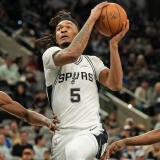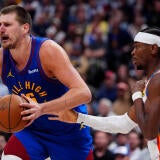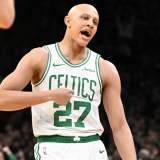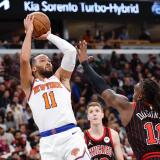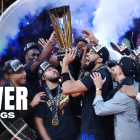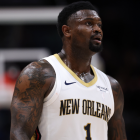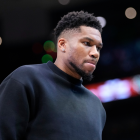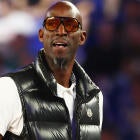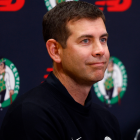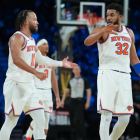Ranking 10 biggest MVP snubs in NBA history, including Karl Malone's win over Michael Jordan
The 1997 MVP covered in 'The Last Dance' was far from the worst trophy ever awarded
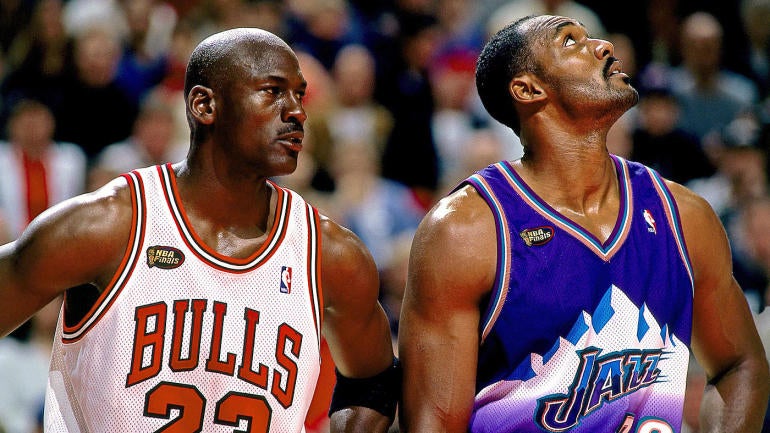
Michael Jordan never struggled to find motivation, but in the lead up to the 1997 NBA Finals, he honed in something he knew quite well: the MVP award. By then, Jordan had won four of them, and his 1996-97 season should have put a fifth on his mantle. The voters disagreed, and the trophy went to Karl Malone, whom Jordan would meet in those '97 Finals. As he admitted in "The Last Dance," he was none too pleased with the voters' decision.
"I'm not saying he wasn't deserving of it," Jordan said in the documentary. "All I'm saying is that that fueled the fire in me. 'OK, you think he's the MVP? That's fine, no problem.'"
Jordan proved his point in the series, ultimately winning the far more important Finals MVP trophy, but it got us thinking: Where does Jordan's 1997 snub stand in the history of MVP mistakes? Below are the 10 biggest MVP snubs in NBA history. Keep in mind that until the 1980-81 season, the award was voted on by players. Thereafter, it was determined by media.
1. Dave Cowens over Kareem Abdul-Jabbar (1972-73)
- Cowens stats: 20.5 points, 16.2 rebounds, 4.1 assists, 12.0 win shares
- Abdul-Jabbar stats: 30.2 points, 16.1 rebounds, 5.0 assists, 21.9 win shares
Poor Kareem had a few factors working against him here. First, the Celtics won 68 games that season and the players (who voted on the MVP award at the time) clearly wanted to reward someone from that all-time great regular-season team. Second, Abdul-Jabbar had won the MVP in the previous two seasons, so there was apparently some voter fatigue at work here. But let's be honest, Kareem deserved this MVP. The Bucks won 60 games that season, so it's not like he was putting up huge stats for a mediocre team.
Win shares is hardly a perfect stat, but this is the largest negative discrepancy in win shares between an MVP winner and the second-place finisher in NBA history, and it's not even close. You could even make a strong argument that Cowens wasn't even the best player on his own team, as John Havlicek outpaced him in points per game, win shares and true shooting percentage. This wasn't the only time Kareem was robbed of MVP honors, but it was certainly the most egregious. -- Colin Ward-Henninger
2. Derrick Rose over LeBron James and Dwight Howard (2010-11)
- Rose stats: 25 points, 4.1 rebounds, 7.7 assists, 13.1 win shares
- James stats: 26.7 points, 7.5 rebounds, 7.0 assists, 15.6 win shares
- Howard stats: 22.9 points, 14.1 rebounds, 1.4 assists, 14.4 win shares
LeBron led Rose in the following statistics: points, rebounds, blocks, steals, minutes, field goal percentage, effective field goal percentage, true shooting percentage, offensive win shares, defensive win shares, VORP, box plus-minus, PER, net rating and on/off net rating differential.
Rose led James by 0.7 assists per game, 0.02 percent from behind the arc and 9.9 percent at the free-throw line. That's it. Why is the first paragraph so much longer than the second? Because Derrick Rose should not have won the 2011 MVP award.
But James forfeited any realistic chance at winning the award the moment he declared his intentions to take his talents to South Beach. The appalled sportswriters that spent the next several months clutching their pearls over an athlete having the audacity to leave his hometown team were the same ones who voted for Rose, Chicago's hometown hero, to win this fraudulent award.
Yes, he was the best player on a 62-win team, but he was hardly the only person responsible for that success. Chicago won behind the No. 1-ranked defense in the NBA, which Rose had little to do with. The offense that he led was ranked only 11th. The Bulls were so good defensively that they were only 2.7 points per 100 possessions worse with Rose on the bench because their defense improved enough to offset the offensive loss. This was a completely narrative-driven award.
That isn't to say that James was a slam dunk. Howard, as the Defensive Player of the Year and anchor of a 52-win outfit with a truly abysmal Magic supporting cast, had a real case. All we can say for certain is that Rose should not have won the award. There is virtually no argument in his favor. -- Sam Quinn
3. Bill Russell over Wilt Chamberlain and Oscar Robertson (1961-62)
- Russell stats: 18.9 points, 23.6 rebounds, 4.5 assists, 15.5 win shares
- Chamberlain stats: 50.4 points (not a typo), 25.7 rebounds (also not a typo), 2.4 assists, 23.1 win shares
- Robertson stats: 30.8 points, 12.5 rebounds, 11.4 assists, 15.6 win shares
One man averaged over 50 points per game. Another man was the first NBA player to ever average a triple-double (a feat that wasn't duplicated for 55 years), and also averaged over 30 points in the process. Neither of those men won MVP following the 1961-62 season. The players voted on the award, and it is perhaps the highest sign of respect for Russell, who to this day is venerated for his willingness to put team success over individual stats. But come on.
Robertson actually received the second-most first-place votes with 13, and Chamberlain received a paltry nine compared to Russell's overwhelming majority of 51 first-place votes. You can, of course, point to winning -- the Celtics won 60 games that season, while Chamberlain's Philadelphia Warriors had 49 and Robertson's Cincinnati Royals won 43 -- but if you're talking about being valuable, you really can't top Chamberlain's season, which resulted in the fourth-highest single-season win share total in NBA history. No offense to Russell, but to have two players put up historic NBA seasons and for neither to win the MVP is utterly baffling. -- Colin Ward-Henninger
4. Steve Nash over Kobe Bryant (2005-06)
- Nash stats: 18.8 points, 10.5 assists, 44 percent 3-pointers, 12.4 win shares
- Bryant stats: 35.4 points, 5.3 rebounds, 4.5 assists, 15.3 win shares
With Shaquille O'Neal in his second season in Miami and the Lakers not expected to be title contenders, we knew we were in for some fireworks from Bryant -- and he certainly provided them. His 35.4 points per game is the ninth-highest single-season average in NBA history (fourth among players not named Wilt Chamberlain), and when adjusted for era by equalizing pace, NBC Sport's Tom Haberstroh found that it was the best per-possession scoring season ever. He had two of the most prolific scoring games in league history, first by scoring 62 points in three quarters against the Dallas Mavericks, then by dropping an unconscionable 81 points against the Toronto Raptors a month later.
This isn't to diminish Nash -- putting up a 50/40/90 season while leading the league in assists on a 54-win Phoenix Suns team that only had Amar'e Stoudemire for three games is no simple task -- but Kobe was clearly the most valuable player in the league, as he somehow dragged a ragtag roster to the seventh seed in the Western Conference and put up the fifth-highest effective field goal percentage of his career (.491) despite being the No. 1, 2, 3, and 4 option on his team. Here's a look at the other Lakers who averaged over 15 minutes per game that season:
- Lamar Odom
- Smush Parker
- Kwame Brown
- Chris Mihm
- Devean George
- Luke Walton
- Brian Cook
- Sasha Vujacic
If you put Nash, or almost anyone else in the league at that point, with that group, they're not winning 45 games. Nash getting the MVP over Kobe looked even worse as Bryant and the Lakers pushed the Suns to a seventh game in the first round of the playoffs, with Kobe hitting a game-winner at the buzzer in Game 4 to take a 3-1 lead. Kobe won his lone MVP two seasons later and, as we'll discuss in this piece, he probably didn't deserve that one. But he certainly deserved the award in 2005-06, so I guess everything evens out. -- Colin Ward-Henninger
5. Karl Malone over Michael Jordan (1996-97)
- Malone stats: 27.4 points, 9.9 rebounds, 4.5 assists, 16.7 win shares
- Jordan stats: 29.6 points, 5.9 rebounds, 4.3 assists, 18.3 win shares
Michael Jordan wasn't competing against Karl Malone for this trophy. He was competing against Michael Jordan. Consider the following:
In 1995-96, Michael Jordan averaged 30.4 points, 49.5 FG%, 6.6 rebounds, 4.3 assists, 20.4 win shares along with 72 team wins.
In 1996-97, Michael Jordan averaged 29.6 points, 48.6 FG%, 5.9 rebounds, 4.3 assists, 18.3 win shares along with 69 team wins.
Jordan nearly won the '96 MVP award unanimously. But he slipped by an almost imperceptible amount a year later, and Malone's numbers improved a similar rate. Somehow, that was enough to swing one of the most lopsided MVP votes ever all the way to Malone.
I call shenanigans. Voters were simply sick of voting for Jordan, so they used his very, very slight decline to justify finding another winner. They landed on Malone, and ironically did so a year early. He had a much stronger case against Jordan in 1998. He actually beat Jordan in win shares, PER, box plus-minus and VORP that season, and while their teams had identical records, Malone's Jazz won both head-to-head matchups. Voters were just so ashamed of themselves for the 1997 debacle that they gave the 1998 trophy to Jordan as an apology. -- Sam Quinn
6. Allen Iverson over Shaquille O'Neal (2000-01)
- Iverson stats: 31.1 points, 4.6 assists, 2.5 steals, 11.8 win shares
- O'Neal stats: 28.7 points, 12.7 rebounds, 2.8 blocks, 14.9 win shares
Shaq was coming off a 1999-00 MVP campaign and his stats took a slight dip, so perhaps that's why the media felt the need to give the award to Iverson, who led the league in scoring and steals for a Philadelphia 76ers team that finished with the best record in the Eastern Conference. But O'Neal did absolutely nothing to lose the award -- in fact, he should have won it after leading the Lakers to 56 wins, the same total as the Sixers, but instead received just seven first-place votes compared to Iverson's 93.
Sure, Iverson averaged more points, but he played more minutes per game than Shaq with a much higher usage rate (35.9 to 31.6). As you could imagine, O'Neal destroyed Iverson from an efficiency standpoint. Shaq led the league by shooting 57 percent from the field compared to Iverson's 42 percent. Even if you factor in O'Neal's substandard free throw shooting, he still had a comfortable lead on Iverson in true shooting percentage, 57.4 to 51.8.
This was a clear case of narrative getting in the way of logic, as the 76ers jumped from third place in the Atlantic Division the previous year to leading the East, while the Lakers fell from 67 wins in 1999-00 to 56 in 2000-01. As fate would have it, the two superstars would meet in the NBA Finals that postseason, with the 76ers handing the Lakers their only playoff loss in Game 1, thanks to 48 points from Iverson. Shaq took home Finals MVP honors with averages of 33 points, 15.8 rebounds, 4.8 assists and 3.4 blocks, while Iverson averaged 35.6 points, 5.6 rebounds and 3.8 assists in the five-game series. -- Colin Ward-Henninger
7. Wes Unseld over Willis Reed (1968-69)
- Unseld stats: 13.8 points, 18.2 rebounds, 2.6 assists, 10.8 win shares
- Reed stats: 21.1 points, 14.5 rebounds, 2.3 assists, 14.7 win shares
Unseld holds two important distinctions in NBA history. First, he is the lowest-scoring MVP in history, and that doesn't do his limited individual offensive impact justice. He was the fifth-leading scorer on his own team, which included Hall of Famer Earl Monroe having his best offensive season. Unseld's outlet passing was obviously critical as the Bullets finished second in the NBA in pace, but Washington's offense was ranked No. 7 out of only 14 teams. There is little evidence to suggest that Unseld's presence was the key to elite offensive play. If defense was what won him this award, it should be noted that his Bullets were only 1.6 points per 100 possessions better than Reed's Knicks, who were significantly better offensively.
Unseld's other place in the history books? He is the last rookie ever to win MVP, and the only player besides Wilt Chamberlain ever to have accomplished the feat in his first year. Chamberlain is relevant to this specific award as well, as he had won the three previous MVPs. While players likely weren't as impacted by narrative, the notion that they might be looking for someone new to take his place is not far-fetched. Unseld, being a rookie, was as new as a player could possibly be, and his passing would have made opponents envious of his teammates.
Reed's circumstances weren't quite as favorable. His rebounding numbers were deflated by sharing a frontcourt with fellow Hall of Famers Dave DeBusschere and Walt Bellamy, and while he was a strong passer, having Walt Frazier as a point guard was never going to allow him proper credit for that. That gave Unseld small leads in passing, rebounding and defense, but they should not have been enough to overcome the vast scoring difference between the two in terms of both volume and efficiency. This should have been Reed's trophy. -- Sam Quinn
8. Bill Walton over Kareem Abdul-Jabbar, George Gervin and David Thompson (1977-78)
- Walton stats: 18.9 points, 13.2 rebounds, 5.0 assists, 8.4 win shares
- Abdul-Jabbar stats: 25.8 points, 12.9 rebounds, 4.3 assists, 12.1 win shares
- Gervin stats: 27.2 points, 5.1 rebounds, 3.7 assists, 12 win shares
- Thompson stats: 27.2 points, 4.9 rebounds, 4.5 assists, 12.7 win shares
We may never again see an MVP race quite like the one that took place in 1978. The two clear best players in the NBA, Walton and Abdul-Jabbar, both missed significant time. Walton played in 58 games while Kareem edged him out at 62. With only lesser players meeting the typical threshold for games played, Walton won the award after his Blazers started 50-10 with him in the lineup.
But let's be honest, it just isn't possible to provide your team with the most value of any player in basketball if you only play 70 percent of the season. Gervin and Thompson were both worse players than Walton, but they combined to miss only two games all year. Both dwarfed Walton in total win shares, each having at least 12, and while Walton produced more win shares per 48 minutes, the gap there was minimal.
Even if Walton led Gervin and Thompson in that metric, he didn't come close to Kareem. Abdul-Jabbar produced .257 win shares per 48 minutes. Not only does it beat Walton's .209, but the gap is so vast than it is bigger than the one that existed between Walton and Dave Cowens, who came in 21st at .162.
This one is simple. If Most Valuable Player is meant to measure total value added, the trophy should have gone to either Gervin or Thompson. If it is meant to measure impact while on the floor, Kareem wins by a country mile. That should be one of the enduring lessons of this story. If we're being totally honest, Kareem probably should've won every MVP of the 1970s. -- Sam Quinn
9. Kobe Bryant over Chris Paul and LeBron James (2007-08)
- Bryant stats: 28.3 points, 6.3 rebounds, 5.4 assists, 13.8 win shares
- Paul stats: 21.1 points, 4.0 rebounds, 11.6 assists, 17.8 win shares
- James stats: 30.0 points, 7.9 rebounds, 7.2 assists, 15.2 win shares
Don't worry, Mamba maniacs. Nobody is suggesting that Kobe shouldn't have an MVP award. He just happened to win the wrong one. As we've established, his 2006 trophy was stolen by Nash, so this one was given in its place as a lifetime achievement award. On merit for the 2007-08 season, Paul was almost inarguably more valuable than Bryant.
Bryant finished third in box plus-minus, fourth in win shares, seventh in VORP and eighth in PER for the 2007-08 campaign. Paul and LeBron James jockeyed for the top two spots in each of those categories. James won the scoring title over Bryant, and did so not only with an inferior supporting cast, but also better efficiency numbers. The Lakers were 8.6 points per 100 possessions worse with Bryant on the bench. Paul's Hornets dipped by 10.3 points per 100 possessions without him; James' Cavaliers by 10.9.
Oh, and let's not forget, Kobe demanded a trade before this season. The Lakers started a relatively pedestrian 9-8 as they dealt with persistent rumors before slowly growing into a contender (thanks at least in part to the Pau Gasol trade). Even if Bryant's cumulative on-court value matched Paul's and James', which it doesn't, the negative value he created off the court has to count for something.
The real question here is who should have won between Paul and James. It's ultimately a matter of preference. James has a very slight edge in most individual numbers. Paul's team won 11 more games, and did so in the more difficult Western Conference. James also missed five more games. Add all of that up and he should be the favorite, but LeBron would have been a worthy choice as well. -- Sam Quinn
10. Oscar Robertson over Wilt Chamberlain (1963-64)
- Robertson stats: 31.4 points, 9.9 rebounds, 11.0 assists, 20.6 win shares
- Chamberlain stats: 36.9 points, 22.3 rebounds, 5.0 assists, 25.0 win shares
Robertson was rewarded with his only MVP after falling just a hair short of averaging a triple-double for the second time in his career. Under normal circumstances this would have been plenty of fuel to win the award, particularly given the Cincinnati Royals' 55-25 record, the second-best mark in the NBA. But Chamberlain, despite a decline in his gaudy statistical totals, put up the second-most win shares ever for an NBA single season for the San Francisco Warriors, who led the Western Division with 48 wins.
The players, who voted for the award at the time, must have felt it was Robertson's turn to take center stage, as Chamberlain already had an MVP under his belt. It's more than fair, but if you want to really get into who had a better season, Chamberlain wins. He increased his assist total to what was then a career high at five per game, which led to a more spread offensive attack with six Warriors averaging double-figure points for the season. Chamberlain had already been passed over for MVP when he averaged 50 points per game, and when he upped his assists on a first-place team, he still didn't take home the hardware. I'm starting to think the players might not have liked Wilt, who received just 19 first-place votes in 1963-64, compared to 60 for Robertson. -- Colin Ward-Henninger


